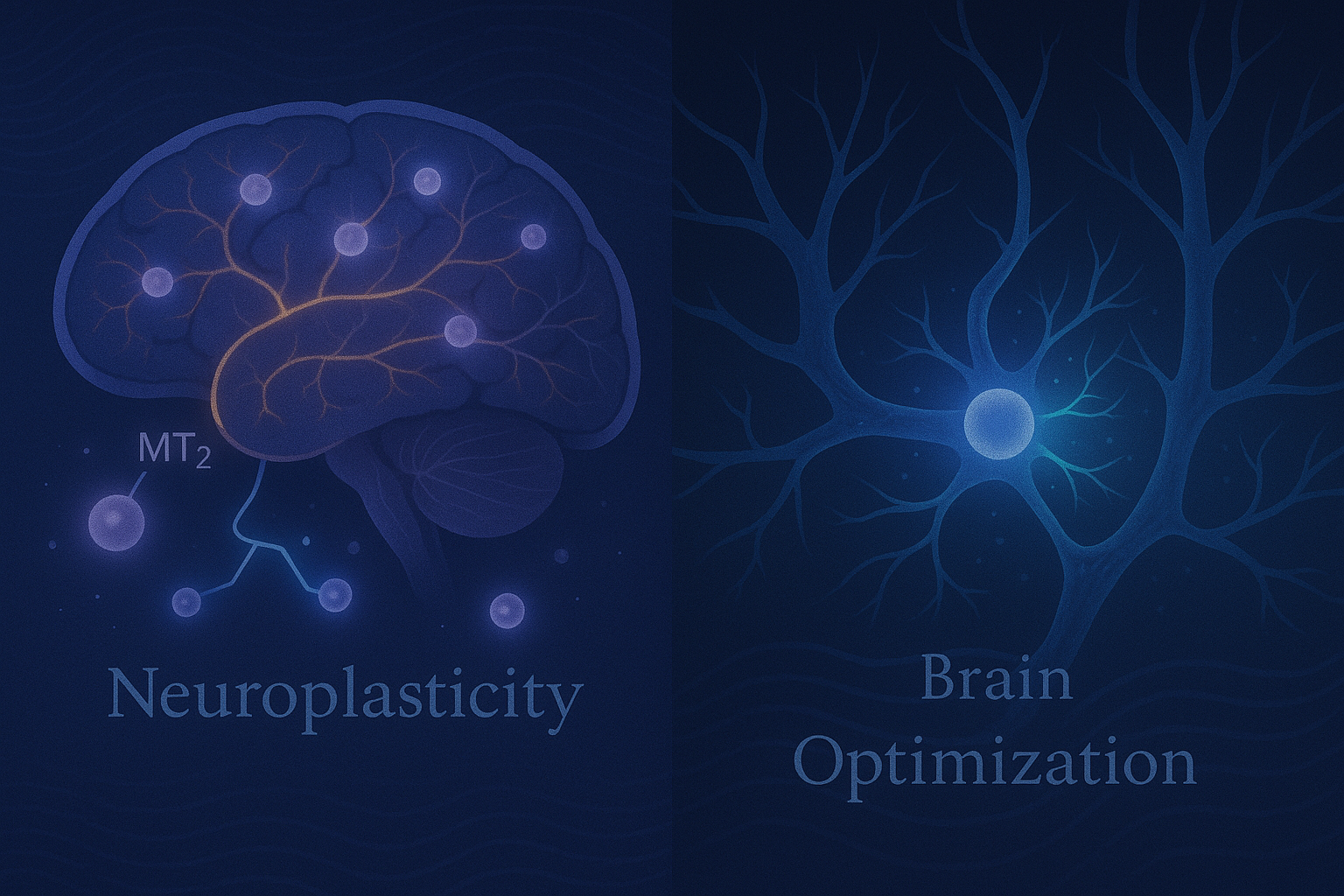Melatonin and Neuroplasticity: The Hidden Brain Optimization Connection

If you’re like most of us, you’ve experienced (at least once!) lying awake at 3 AM, mind racing despite being exhausted.
(Been there. More often than I care to admit.)
Like millions of others struggling with insomnia, you tried everything—sleep hygiene (which does matter), meditation apps, even counting sheep (which, let’s be honest, never worked for anyone).
When I finally discovered melatonin, I expected it to simply help me fall asleep faster.
What I didn’t expect was to stumble upon research suggesting this humble hormone was doing something far more profound in my brain.
Most of us know melatonin as the “sleep hormone”—that little supplement you take when your circadian rhythm is out of whack. But here’s it get fascinating: while we’ve been focused on melatonin’s role in sleep, cutting-edge research reveals it’s actually a direct neuroplasticity modulator. We’re not just talking about better sleep leading to better brain function (though that’s certainly part of it). We’re talking about melatonin actively rewiring your brain’s capacity to adapt, learn, and heal.
Beyond Sleep: Melatonin as a Brain Optimization Molecule
The traditional narrative goes like this: melatonin improves sleep, better sleep enhances brain plasticity, therefore melatonin indirectly benefits brain function. But recent research is flipping this script entirely. MT2 receptors are involved in hippocampal synaptic plasticity and memory processes, though research shows melatonin may actually constrain rather than enhance synaptic plasticity. However, melatonin does directly promote neurogenesis—the birth of new brain cells—suggesting it works through multiple pathways beyond just improving sleep.
Think about it this way: your brain is constantly remodeling itself, forming new neural connections, pruning unnecessary ones, and adapting to new experiences. This process, called neuroplasticity, is what allows you to learn new skills, recover from injuries, and maintain cognitive function as you age. For those of us dealing with sleep disorders, this adaptive capacity often feels compromised. We struggle with memory, focus, and that general sense that our minds aren’t operating at full capacity.
Here’s where melatonin becomes truly interesting. Rather than simply sedating us into sleep, it appears to be actively optimizing our brain’s hardware for peak performance.
The Neuroplasticity Connection: How Melatonin Rewires Your Brain
Let me share something that’ll surprise anyone who’s done even a cursory amount of research into this topic.Studies show that melatonin increases the number of new neurons derived from adult hippocampal neural precursor cells in vitro by promoting cell survival. This wasn’t about sleep at all—this was about melatonin directly stimulating the birth of new brain cells.
The hippocampus, that crucial brain region responsible for memory formation and learning, appears to be particularly responsive to melatonin’s neurogenic effects. Interestingly, while melatonin promotes the creation of new neurons, research suggests it may actually constrain certain aspects of synaptic plasticity, creating a more nuanced picture of how this hormone affects brain function.
The MT1 and MT2 Receptor Story
To understand how this works, we need to talk about melatonin’s two main receptors: MT1 and MT2. Think of these as specialized docking stations in your brain that melatonin binds to, triggering different cascades of beneficial effects. While MT1 receptors are primarily involved in sleep regulation, MT2 receptors tell a different story entirely.
MT1 and MT2 melatonin receptors are expressed in nonoverlapping neuronal populations, meaning they’re working in different brain regions to accomplish different tasks. The MT2 receptors, particularly abundant in the hippocampus, play complex roles in memory and learning processes, though research suggests they may actually constrain certain forms of synaptic plasticity while promoting neurogenesis.
This discovery has profound implications for anyone dealing with sleep disorders. When you take melatonin, you’re not just getting a sleep aid—you’re potentially:
- Stimulating the growth of new brain cells (neurogenesis)
- Enhancing synaptic plasticity (the strength of connections between neurons)
- Improving memory consolidation processes
- Protecting existing neurons from damage and aging
Real-World Implications for Sleep Disorder Sufferers
As someone who’s navigated the frustrating world of sleep disorders (and now helps others with them), I’ve seen firsthand how this reframe changes everything. Instead of viewing melatonin as a temporary fix for poor sleep, we can understand it as a long-term brain optimization strategy.
Consider a nurse (shift-worker) named Sarah. She’d been struggling with chronic insomnia for over a decade, trying everything from prescription sleep medications to elaborate bedtime routines. What struck me about her story wasn’t just the sleep issues—it was how she described feeling “mentally foggy” and having trouble retaining new information, even during the day.
When she started taking melatonin, the initial improvement in sleep quality was expected. But what surprised both of us was how her cognitive function seemed to improve over the following months. She reported better focus, clearer thinking, and an improved ability to learn new skills at work. Was this simply the result of better sleep? Possibly. But given what we now know about melatonin’s direct neuroplasticity effects, it’s likely that multiple mechanisms were at play.
The Timing Factor: When Neuroplasticity Happens
Here’s something fascinating that most people don’t realize: melatonin stimulates all stages of neuroplasticity, and much of this happens during specific windows when our brains are most adaptable. Sleep isn’t just a passive state—it’s when your brain becomes a construction site, actively remodeling neural pathways based on the day’s experiences.
But here’s the twist: melatonin appears to be the construction foreman, coordinating this entire process. It’s not just present during sleep; it’s actively orchestrating the cellular mechanisms that allow your brain to adapt and optimize itself.
The BDNF Connection: A Key Player in Brain Adaptation
One of the most exciting aspects of melatonin’s neuroplasticity effects involves its interaction with Brain-Derived Neurotrophic Factor (BDNF). Think of BDNF as fertilizer for your brain cells—it promotes the growth, survival, and differentiation of neurons. Low BDNF levels are associated with depression, anxiety, and cognitive decline, while higher levels correlate with better memory, learning, and overall brain health.
What’s particularly interesting is how melatonin appears to modulate BDNF in ways that support neurogenesis and neural stem cell function. Research shows that melatonin can promote the production of BDNF in neural stem cells, particularly under stress conditions. This suggests that melatonin may help maintain the brain’s regenerative capacity even when facing challenges that typically impair neurogenesis.
Practical Applications: Optimizing Your Brain’s Adaptive Capacity
So how can you harness melatonin’s neuroplasticity benefits if you’re dealing with sleep disorders? Here are the key strategies I’ve learned through research and personal experience:
1. Timing Is Everything
Most people take melatonin right before bed, but the neuroplasticity research suggests a more nuanced approach. Consider taking melatonin 1-2 hours before your intended bedtime. This allows the hormone to begin its neuroplasticity work while you’re still awake, then continue optimizing brain function throughout the night.
2. Consistency Beats Intensity
Melatonin is able to modulate cell proliferation and neural differentiation processes in neural stem/progenitor cells while improving neuronal maturation of neural precursor cells and newly created postmitotic neurons. This process doesn’t happen overnight—it requires consistent exposure to melatonin over time.
People who take melatonin sporadically often miss out on these deeper neuroplasticity benefits. The brain needs reliable signals to optimize its adaptive processes.
3. Quality Matters More Than Quantity
In the beginning, I assumed higher doses were always better. But melatonin research suggests otherwise. The MT2 receptors involved in neuroplasticity appear to be quite sensitive, meaning that moderate, consistent doses may be more effective than occasional high doses.
4. Consider the Bigger Picture
While melatonin is powerful on its own, it works best as part of a comprehensive approach to brain health. Regular exercise, adequate nutrition, stress management, and social connection all support the neuroplasticity processes that melatonin helps coordinate.
The Circadian Connection: Why Timing Matters for Brain Optimization
One aspect of melatonin’s neuroplasticity effects that particularly fascinates me is its relationship with circadian rhythms. Your brain doesn’t just randomly decide when to undergo plastic changes—these processes are carefully timed to coincide with your natural sleep-wake cycle.
In rodents, melatonin stimulates all stages of neuroplasticity, but this stimulation appears to be most effective when it aligns with your natural circadian rhythm. This is why shift workers and people with irregular sleep schedules often struggle with more than just sleep—their brains’ adaptive capacity may be compromised.
For those of us dealing with sleep disorders, this presents both a challenge and an opportunity. The challenge is that our disrupted sleep patterns can interfere with optimal neuroplasticity. The opportunity is that melatonin supplementation can help restore not just sleep timing, but the underlying brain optimization processes that depend on proper circadian function.
Looking Forward: The Future of Brain Optimization
We’re probably on the verge of a major shift in how we think about brain health. The traditional approach has been reactive—we wait for problems to develop, then try to fix them. But melatonin’s neuroplasticity effects suggest a more proactive approach: actively optimizing our brain’s adaptive capacity before problems arise.
This is particularly relevant for those of us in the sleep disorder community. We know that chronic sleep problems increase the risk of cognitive decline, mood disorders, and neurodegenerative diseases. But what if melatonin supplementation could do more than just improve sleep? What if it could actively protect and enhance our brain’s long-term health?
Recent research on psilocybin-melatonin hybrid compounds that appear to bind selectively to MT1 receptors while retaining abilities to enhance synaptic growth suggests that the therapeutic potential of melatonin-based neuroplasticity interventions is just beginning to be explored.
A Personal Reflection on the Journey
Three years after that first sleepless night that led me down this research rabbit hole, I’ve come to see melatonin not just as a supplement, but as a window into the incredible adaptability of the human brain. What started as a simple quest for better sleep has evolved into a deeper appreciation for the complex mechanisms that allow our brains to heal, adapt, and optimize themselves.
People usually start with the same basic question: “Will this help me sleep better?” But increasingly, our conversations evolve beyond sleep to encompass broader questions about cognitive health, brain aging, and optimization. This shift in perspective—from viewing melatonin as a sleep aid to understanding it as a brain optimization molecule—has been transformative.
What questions does this raise for you? If you’re dealing with sleep disorders, how might this reframe change your approach to treatment? Are you simply trying to get through the night, or are you actively working to optimize your brain’s adaptive capacity?
Moving Beyond Traditional Views
The research on melatonin and neuroplasticity challenges us to think differently about both sleep disorders and brain health. Rather than seeing insomnia as simply a nighttime problem, we might consider it a disruption of our brain’s fundamental optimization processes. Rather than viewing melatonin as a temporary fix, we might see it as a tool for long-term cognitive enhancement.
This doesn’t mean melatonin is a magic bullet—no supplement is. But it does suggest that the benefits of addressing sleep disorders may extend far beyond better rest. When we optimize sleep, we’re potentially optimizing our brain’s capacity to adapt, learn, and maintain itself throughout our lives.
For those of us who’ve struggled with sleep disorders, this represents a profound shift from feeling like victims of our own biology to understanding ourselves as active participants in our brain’s ongoing optimization. We’re not just trying to get through the night—we’re investing in our cognitive future.
The intersection of sleep, melatonin, and brain adaptation offers hope for a more comprehensive approach to brain health. As research continues to reveal the deep connections between these systems, we’re likely to discover even more ways to harness our brain’s natural plasticity for better health and performance.
What’s your experience been with melatonin and cognitive function? Have you noticed changes beyond just sleep improvement?
I’d love to hear your story and continue this conversation about the fascinating world of brain optimization.
The information in this article is for educational purposes only and is not intended as medical advice. Always consult with a healthcare professional before starting any new supplement regimen, especially if you have underlying health conditions or are taking medications.

